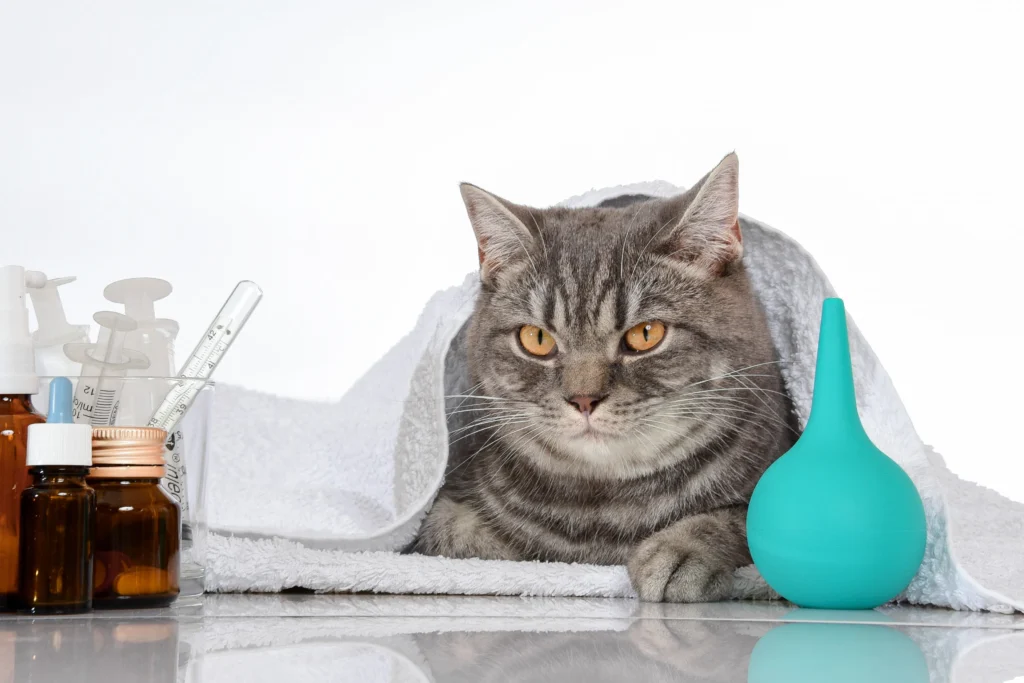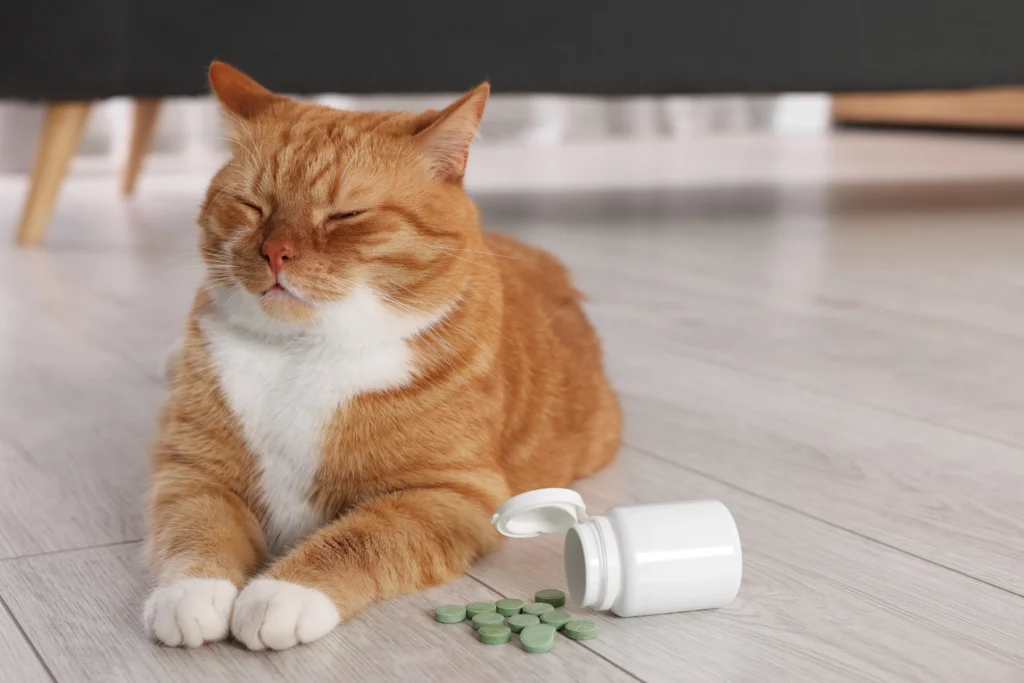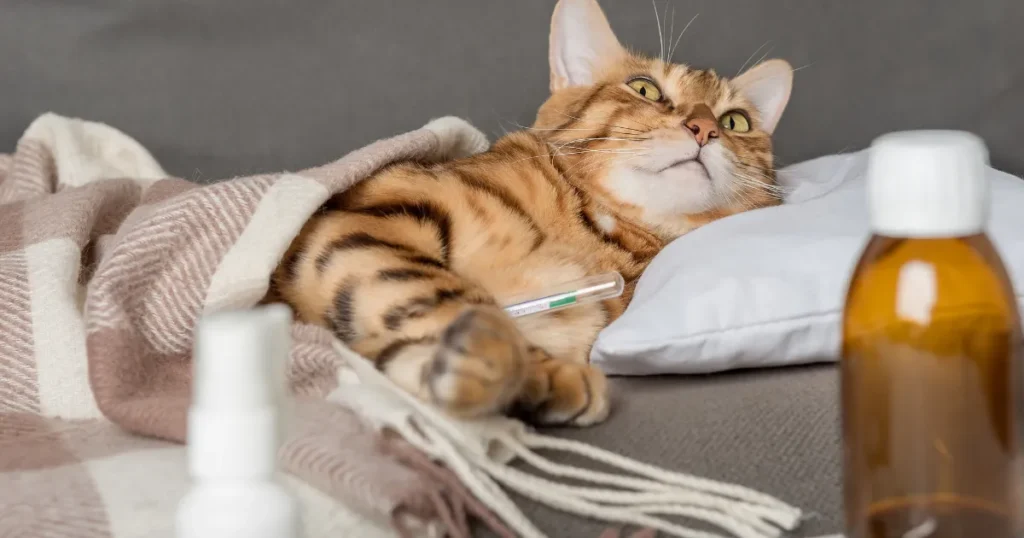Table of Contents
- Understanding Cat Anxiety: Signs and Symptoms
- Prescription Cat Anxiety Medication Options
- Over-the-Counter Solutions for Cat Anxiety
- Natural Alternatives for Managing Cat Anxiety
- CBD Oil and Alternative Treatments
- Dosage Guidelines and Administration Tips
- Potential Side Effects and Safety Considerations
- Combining Behavioral Therapy with Cat Anxiety Medication
- Conclusion
- FAQ
Cat Anxiety Medication
Managing cat anxiety can be tough for pet owners. It’s key to find the right medication for your cat. This helps them feel calm and safe, no matter the cause of their stress.
Vets suggest a full plan to tackle cat anxiety. The right medication varies based on your cat’s symptoms and health. You can choose from prescription drugs or natural remedies to ease their anxiety.
Choosing the right treatment needs careful thought and a vet’s advice. Every cat is different, so it’s vital to get personalized advice from a vet. They can help find the best way to manage your cat’s anxiety.
Key Takeaways
- Multiple treatment options exist for cat anxiety
- Professional veterinary consultation is critical
- Medication can be combined with behavioral strategies
- Natural and prescription treatments are available
- Individual cat needs determine the best approach
Understanding Cat Anxiety: Signs and Symptoms
Cat anxiety can really affect your pet’s life. Spotting the signs early helps figure out if your cat needs medication. It also shows how these meds work.
Cats can get stressed for many reasons. To know if they need help, watch for changes in how they act and feel.
Physical Symptoms of Anxiety in Cats
Look out for these physical signs of anxiety in cats:
- Excessive grooming or hair loss
- Sudden weight loss or changes in appetite
- Digestive issues like vomiting or diarrhea
- Frequent urination outside the litter box
- Trembling or unusual body tension
Behavioral Changes to Watch For
Knowing the behavioral signs helps find the right anxiety medication:
- Increased aggression or irritability
- Excessive hiding or withdrawal
- Constant meowing or vocalization
- Destructive behavior
- Unexplained panic or restlessness
When to Seek Professional Help
If your cat’s anxiety symptoms last a while, see a vet. They can find the cause and suggest treatments.
“Early intervention can significantly improve your cat’s mental health and overall well-being.” – Veterinary Behavioral Specialists
Getting professional advice is key if symptoms last more than a few weeks. Or if they mess up your cat’s usual routine.
Prescription Cat Anxiety Medication Options
Dealing with cat anxiety can be tough for pet owners. Prescription medication offers a targeted way to help your cat manage stress and behavioral issues. Veterinarians have several safe options that can greatly improve your pet’s life.
Prozac is a common choice for cats with anxiety. It’s an SSRI that helps regulate mood and reduce stress behaviors. Your vet might suggest it for cats with ongoing anxiety symptoms.
*”Not all cats respond the same way to anxiety medications. Working closely with your veterinarian is crucial to finding the right treatment.”*
Here are some common prescription medications for cat anxiety:
- Fluoxetine (Prozac)
- Clomipramine
- Amitriptyline
- Buspirone
Each medication works in its own way to address anxiety symptoms. Some fix chemical imbalances in the brain, while others reduce stress behaviors.
| Medication | Primary Use | Typical Dosage |
|---|---|---|
| Fluoxetine | Generalized Anxiety | 5-10 mg per cat daily |
| Clomipramine | Separation Anxiety | 0.5 mg per kg daily |
| Buspirone | Social Anxiety | 2.5 mg twice daily |
Before starting any medication, talk to your vet. They’ll check your cat’s health, figure out the best treatment, and guide you through it.
Over-the-Counter Solutions for Cat Anxiety
Managing your cat’s anxiety doesn’t always need a prescription. Many pet owners find relief with over-the-counter cat anxiety medication and calming supplements. These can help soothe your feline friend’s nerves.
Pet parents have many effective options to address their cat’s stress and anxiety. These non-prescription solutions offer gentle, supportive relief. They help cats with various anxiety triggers.
Calming Treats and Supplements
Cat calming pills and sprays are convenient ways to reduce anxiety. Look for supplements with key ingredients that support emotional balance:
- L-theanine: Promotes relaxation without sedation
- Tryptophan: Helps regulate mood and reduce stress
- Vitamin B complex: Supports nervous system health
Pheromone Products
Synthetic pheromone solutions mimic natural calming signals that cats produce. These products create a sense of security in stressful environments.

| Pheromone Product Type | Key Benefits | Best Used For |
|---|---|---|
| Feliway Diffuser | Reduces territorial stress | Home environment anxiety |
| Spray Formulas | Quick targeted application | Travel or specific stress triggers |
| Collar Pheromone Devices | Continuous calming effect | Cats with persistent anxiety |
Herbal Remedies and Their Effectiveness
Natural herbal solutions can provide gentle anxiety relief for cats. Chamomile and valerian root are known for their calming properties.
“Natural remedies can be a safe first step in managing your cat’s anxiety.” – Veterinary Behavioral Specialist
Always talk to your veterinarian before starting any new calming supplements or treatments. This ensures they’re right for your cat’s specific needs.
Natural Alternatives for Managing Cat Anxiety
Dealing with a stressed cat can be tough. But, natural remedies for cat anxiety offer gentle and effective solutions. They help your feline friend feel calm and secure. Understanding how to calm a stressed cat naturally can make a big difference in your pet’s well-being.
Creating a soothing environment is key when addressing cat anxiety. The best natural cat anxiety medication often starts with simple environmental changes. These changes can dramatically reduce your cat’s stress levels.
- Design safe spaces with cozy hiding spots
- Use calming pheromone diffusers
- Implement consistent daily routines
- Provide interactive play sessions
Interactive play is a powerful tool for managing feline anxiety. Puzzle feeders and engaging toys can help redirect nervous energy. They also provide mental stimulation.
| Natural Anxiety Reduction Method | Effectiveness |
|---|---|
| Interactive Play | High |
| Environmental Enrichment | Medium to High |
| Consistent Routine | Medium |
“A calm environment is the foundation of a happy cat.” – Veterinary Behavioral Specialists
Consider adding soft background music designed for cats. Some animals respond well to classical or ambient sounds. These sounds can create a relaxing atmosphere.
Remember, each cat is unique. What works for one might not work for another. So, be patient and observe when exploring natural anxiety management techniques.
CBD Oil and Alternative Treatments
Pet owners are looking for natural ways to help anxious cats. They are turning to CBD oil as a promising option. It has become a topic of interest in veterinary care.
Exploring CBD oil for cat anxiety needs careful research. It offers a natural way to manage stress in cats. This is different from traditional medications.
Benefits of CBD for Cats
CBD oil can help cats with anxiety a lot. It can:
- Reduce stress and nervous behaviors
- Help cats relax
- Support emotional balance
- Potentially ease chronic pain
Proper Dosage Guidelines
Finding the right CBD dose for your cat is important. It depends on:
- Your cat’s weight
- The level of anxiety
- The CBD product’s strength
- Your cat’s metabolism
“Always start with the lowest recommended dose and observe your cat’s response carefully.” – Veterinary Experts
Safety Considerations
When looking for ways to help anxious cats, safety is key. Talk to your vet before using CBD oil. Watch for side effects like drowsiness or changes in appetite.
Remember, CBD is not a cure-all. It should be part of a bigger plan to manage anxiety.
Dosage Guidelines and Administration Tips
It’s important to give your cat the right amount of anxiety medication. Knowing how long it takes for the medication to work is key. This helps pet owners support their cat’s mental health.
Every cat is different when it comes to anxiety meds. That’s why getting advice from a vet is crucial. Your vet will choose the right dose based on several things:
- Cat’s body weight
- Age and overall health status
- Specific anxiety symptoms
- Existing medical conditions
Important: Never give your cat human anxiety medication. These can be very harmful and even deadly to cats. Always talk to a vet for the right medication.
“Precision in medication is key to managing your cat’s anxiety effectively.” – Veterinary Behavioral Specialists
There are a few ways to give your cat anxiety medication:
- Oral tablets
- Liquid medications
- Transdermal applications
- Flavored chewable treatments
| Medication Type | Typical Onset Time | Duration of Effect |
|---|---|---|
| SSRIs | 2-4 weeks | Ongoing treatment |
| Benzodiazepines | 30-60 minutes | Short-term relief |
| Behavioral Medications | 3-6 weeks | Long-term management |
It’s important to watch how your cat reacts to the medication. Keep a journal of any changes, side effects, and improvements. Share this with your vet at follow-up visits.

Potential Side Effects and Safety Considerations
When looking into cat anxiety medication, knowing the side effects is key. Not all treatments are the same. Spotting warning signs early can prevent big problems.
Common Side Effects to Monitor
Cat anxiety medicine can cause different side effects. Pet owners should keep an eye out for these:
- Decreased appetite
- Drowsiness or extreme lethargy
- Digestive system disruptions
- Behavioral changes
- Sudden mood shifts
When to Contact Your Veterinarian
Certain symptoms need vet help fast. If your cat has severe side effects from anxiety medication, call your vet if you see:
- Persistent vomiting
- Significant weight loss
- Aggressive behavior
- Difficulty breathing
- Seizures or tremors
“Always prioritize your cat’s safety when using anxiety medications without prescription advice.”
Drug Interactions to Avoid
It’s important to know about drug interactions when picking sedatives for anxious cats. Never mix different anxiety meds without a vet’s okay. Some sedatives can be very dangerous together.
Your vet can give you advice to keep your cat safe. They can help you avoid risks with cat anxiety medicine. This ensures your pet gets the best care.
Combining Behavioral Therapy with Cat Anxiety Medication
Managing your cat’s anxiety needs a full plan, not just medicine. Behavioral therapy for anxious cats can really help. It tackles the stress causes and boosts emotional health over time.
“Treating cat anxiety is about understanding the root of the problem, not just masking symptoms.” – Veterinary Behavioral Specialist
Your vet can craft a treatment plan that mixes medicine with behavior changes. These methods work together to lessen your cat’s anxiety and enhance their life quality.
- Desensitization techniques to gradually reduce fear responses
- Counterconditioning to create positive associations
- Environmental enrichment strategies
- Stress reduction methods
Herbal anxiety relief for cats can also support your treatment plan. These natural options can complement prescription meds for a balanced emotional health approach.
| Treatment Approach | Benefits | Recommended For |
|---|---|---|
| Behavioral Therapy | Addresses root causes | Cats with situational anxiety |
| Anti-Anxiety Medication | Immediate symptom management | Severe or chronic anxiety cases |
| Herbal Remedies | Natural stress reduction | Mild to moderate anxiety |
Every cat is different. Work with your vet to make a plan that fits your cat’s needs. This will help them feel safer and more at ease.
Conclusion
Managing cat anxiety needs a deep understanding, patience, and specific treatment plans. The right cat anxiety medication is not a one-size-fits-all solution. It’s a plan made just for your cat’s needs. Your vet is key in creating a good anxiety management plan.
Cat anxiety medication comes in many forms, from prescription drugs to natural supplements. Each has its own benefits. By trying different treatments, you can find the best one for your cat’s anxiety. Changes in behavior and the environment can also help.
Managing anxiety in cats requires ongoing care and attention. Look for small changes in your cat’s behavior and be ready to change treatments. Remember, progress can be slow, and patience is essential. With the right care and guidance, most cats can live happier, calmer lives.
In the end, understanding and tackling your cat’s anxiety shows you care deeply. By spending time, doing research, and showing compassion, you can make your cat feel safer and more at ease.

FAQ
What are the most common signs of anxiety in cats?
Signs of anxiety in cats include too much grooming and hiding. They might also show aggression, urinate in odd places, or destroy things. Cats with anxiety may vocalize too much, lose their appetite, or change their bathroom habits suddenly.
They might also have physical signs like big pupils, shaking, or too much hair loss.
How do I know if my cat needs anxiety medication?
If your cat’s anxiety really affects their life, it’s time to think about medication. Look for signs like constant changes in behavior, stress that lasts, or trouble adapting to new things. If natural ways and changes in routine don’t work, it’s time to see a vet.
Are prescription anxiety medications safe for cats?
Yes, when a vet prescribes them, these medications can be safe and work well for cats. Drugs like fluoxetine (Prozac) or clomipramine are made just for cats. But, you must talk to your vet about possible side effects and check in regularly.
Can I use over-the-counter supplements for cat anxiety?
Yes, you can try calming treats, pheromone diffusers, and natural supplements. Look for products with L-theanine, chamomile, or tryptophan. But, always check with your vet before starting any new supplements.
How long does it take for cat anxiety medication to work?
It usually takes 4-6 weeks for cat anxiety meds to fully work. Some cats might see improvements in 1-2 weeks. But, be patient and keep talking to your vet.
Are natural remedies effective for cat anxiety?
Natural remedies can help with mild to moderate anxiety. Try safe spaces, calming music, toys, routines, and CBD oil or herbs. But, for severe anxiety, you might need both natural remedies and prescription meds.
What are the potential side effects of cat anxiety medications?
Side effects can include changes in appetite, feeling tired, stomach problems, more thirst, weight changes, and changes in behavior. Some cats might have serious side effects like allergic reactions or heart rate changes. Watch your cat closely and tell your vet about any problems.
Can I use human anxiety medication for my cat?
No, never give human meds to cats. They can be very harmful or even deadly. Always talk to a vet about the right meds for your cat.
How can I help my cat’s anxiety without medication?
You can try a routine, toys, pheromone products, safe spots, play, puzzle feeders, and gentle training. Minimize sudden changes and work with a vet behaviorist if needed.
Is CBD oil safe for cats with anxiety?
Some pet owners say CBD oil helps, but it’s important to use the right product. Not all CBD oils are safe for pets, and the right dose is key. Always check with your vet before using CBD oil, make sure it’s for cats, and start with a small dose.
